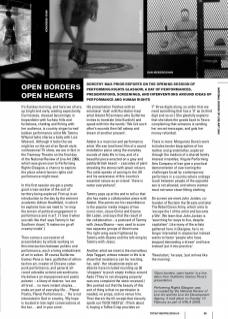It’s Sunday morning, and here we all are, up bright and early, waiting expectantly. Our hostess, dressed becomingly in leopardskin with fuchsia frills and furbelows, chatting and flirting with her audience, is country singer turned lesbian performance artist Ms Tammy Whynot (who shares a body with Lois Weaver). Although it looks like we might be on the set of an Oprah-style confessional TV show, we are in fact in the Tramway Theatre on the final day of the National Review of Live Art 2008, which was given over to Performing Rights Glasgow, a chance to explore the place where human rights and performance might meet.
In this first session we get a pretty good cross-section of the sort of territory being explored. First up is an introduction to the day by the eminent academic Adrian Heathfield, in which he explains how we need to ‘re-map the terrain of political engagement in performance and in art’. (‘I love it when you talk like that’ says Tammy in her Southern drawl, ‘It makes me go all creamy inside’.)
Then comes a succession of presentations by artists working on this intersection between politics and performance, each a living embodiment of art in action. Of course Guillermo Gomez-Pena is here: godfather of ethnotechno art, creator of Chicano cyberpunk performance, and general allround adorable activist extraordinaire. He delivers an impassioned and poetic polemic – a litany of desires: ‘we are all tired… no more instant utopias… make art part of everyday life… Planet Poetry, Planet Performance…’ He is not interested in God or country, ‘My hope is located in late night conversations at the bar… and in your arms’.
His presentation finishes with an emotional ‘duet’ with Kurdistan-Iraqi artist Adalet R Garmiany who Guillermo invites to translate (into Kurdish) and speak with him the words: ‘We lick each other’s wounds then fall asleep and dream of another present’.
Adalet is a musician and performance artist. We see (and hear) film of a sound installation piece using the everyday sounds of daily life in Iraq, and of a beautiful piece enacted on a grey and pebbly British beach – cascades of paint streaking the stones with jewel colours. The artist speaks of coming to the UK and his awareness of this country’s essential nature as an island: ‘there is water everywhere!’.
Tammy pops up at the end to tell us that she has made a collaborative piece with Adalet. She points out his resemblance to the popular media images of two iconic men, Jesus Christ and Osama Bin Laden, and says that the result of the collaboration – a postcard of Tammy with Jesus/Osama – was used to scare two separate groups of Americans. The right-wing were frightened by Tammy-with-Osama and the left-wing by Tammy-with-Jesus.
Another artist we meet is the marvellous Anje Taggart, whose mission in life is to show that resistance can be ‘exciting, fun, safe’. Her situationist-style art attacks have included rounding up 26 ‘shoppers’ to push empty trolleys around Asda (‘They’re not shopping properly’ was one complaint the store received.) She pointed out that the beauty of this sort of thing is that no permission is needed, no props, and no venue hire. Then there’s the till receipt that cleverly spells out ‘FUCK NESTLE’. (Think about it; buying a Toffee Crisp provides an ‘F’ three digits along, so under that we need something that has a ‘U’ as its third digit and so on.) She gleefully explains that she takes the goods back to Tesco complaining that someone is sending her secret messages, and gets her money refunded.
There is more: Margareta Dena’s work includes tender biographies of her mother and grandmother, explored through the medium of a shared family interest in textiles; Virgule Performing Arts Company of Iran give a practical demonstration of overcoming the challenges faced by contemporary performers in a country where onstage touch between people of the opposite sex is not allowed, and where women must not wear close-fitting clothing.
On screen we meet John Jordan, cofounder of Reclaim the Streets and later The Rebel Clown Army, which aims to ‘escape the I of the artist and become a We’. We learn that John Jordan is ‘searching for ways to live, despite capitalism’. Like many of the artists gathered here in Glasgow, he is no longer interested in utopias but instead wants to foster ‘people who have stopped demanding a dream’ and have instead ‘put it into practice.’
‘Revolution,’ he says, ‘just arrives like the morning’.
‘Open borders, open hearts’ is a line taken from Guillermo Gomez Pena’s presentation. Performing Rights Glasgow was co-curated by the National Review of Live Art and the Live Art Development Agency. It took place on Sunday 10 February as part of NRLA 2008.

